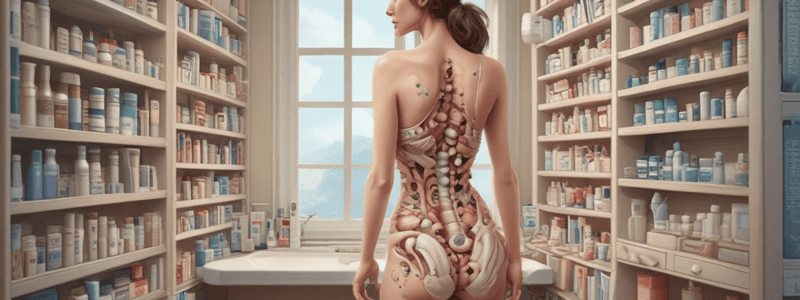Podcast
Questions and Answers
What is the structure of the rectum in terms of length?
What is the structure of the rectum in terms of length?
- Approximately 12 cm long (correct)
- Approximately 15 cm long
- Approximately 10 cm long
- Approximately 8 cm long
Where does the anus drain to?
Where does the anus drain to?
- Middle and inferior haemorrhoidal veins (correct)
- Hepatic portal vein
- Inferior vena cava
- Superior haemorrhoidal vein
What is the pH of the rectum?
What is the pH of the rectum?
- Acidic
- Basic
- Neutral (correct)
- Alkaline
Which conditions can be treated using the rectal route?
Which conditions can be treated using the rectal route?
Why is access to colon a reason for using the rectal route?
Why is access to colon a reason for using the rectal route?
Which blood vessels does the top of the rectum drain to?
Which blood vessels does the top of the rectum drain to?
Which type of vaginal product is specifically mentioned to need an applicator for administration?
Which type of vaginal product is specifically mentioned to need an applicator for administration?
What is the primary issue raised regarding the use of creams and gels as vaginal products?
What is the primary issue raised regarding the use of creams and gels as vaginal products?
Which type of vaginal product is described as generally antiseptic/cleansing and might be considered very messy to use?
Which type of vaginal product is described as generally antiseptic/cleansing and might be considered very messy to use?
Among the types of vaginal products listed, which one is specifically made from silicon and meant to remain in place for several days or weeks?
Among the types of vaginal products listed, which one is specifically made from silicon and meant to remain in place for several days or weeks?
What distinguishes medicated tampons from ordinary menstrual tampons in their use as vaginal products?
What distinguishes medicated tampons from ordinary menstrual tampons in their use as vaginal products?
What determines the formulation type selected for rectal and vaginal products?
What determines the formulation type selected for rectal and vaginal products?
What is the approximate weight of a suppository suitable for babies and small children?
What is the approximate weight of a suppository suitable for babies and small children?
Which type of suppository base melts at or just below body temperature?
Which type of suppository base melts at or just below body temperature?
What is the primary reason for adding a wax to rise the melting point of suppository bases?
What is the primary reason for adding a wax to rise the melting point of suppository bases?
Which suppository base is known for being polymorphic and producing an unstable form when heated above 36°C?
Which suppository base is known for being polymorphic and producing an unstable form when heated above 36°C?
What is the function of water in Polyethylene glycol (PEG) as a suppository base?
What is the function of water in Polyethylene glycol (PEG) as a suppository base?
Which type of gelatin is cationic and may require care with charged drugs when used in a suppository base?
Which type of gelatin is cationic and may require care with charged drugs when used in a suppository base?
What does the standard Glycerin-gelatin mixture for suppositories consist of?
What does the standard Glycerin-gelatin mixture for suppositories consist of?
What is the purpose of adding liquid or soluble drugs to Theobroma Oil as a suppository base?
What is the purpose of adding liquid or soluble drugs to Theobroma Oil as a suppository base?
What should be considered when selecting a Witepsol base for suppositories?
What should be considered when selecting a Witepsol base for suppositories?
What is the primary reason for using Plastic moulds for modern suppositories?
What is the primary reason for using Plastic moulds for modern suppositories?
What is the weight of drug X in a 1g size suppository containing 20%w/w drug X and 80%w/w base?
What is the weight of drug X in a 1g size suppository containing 20%w/w drug X and 80%w/w base?
What is the displacement value (DV) of drug X in the suppository?
What is the displacement value (DV) of drug X in the suppository?
Which type of rectal preparation involves a dispersion of gas in a liquid stabilized by surfactants?
Which type of rectal preparation involves a dispersion of gas in a liquid stabilized by surfactants?
What is the pH of the vaginal environment?
What is the pH of the vaginal environment?
Which type of rectal preparation is used for diagnostic purposes such as barium enema?
Which type of rectal preparation is used for diagnostic purposes such as barium enema?
What is the length of the vaginal tract along the posterior wall?
What is the length of the vaginal tract along the posterior wall?
What is the displacement value of paracetamol in the manufacture of suppositories?
What is the displacement value of paracetamol in the manufacture of suppositories?
What is the theoretical amount of suppository base required to make 9 x 2 g suppositories containing paracetamol 500 mg?
What is the theoretical amount of suppository base required to make 9 x 2 g suppositories containing paracetamol 500 mg?
What is the final formula for making 6 x 1 g suppositories containing aminophylline 130 mg?
What is the final formula for making 6 x 1 g suppositories containing aminophylline 130 mg?
What is the displacement value of metronidazole in the manufacture of suppositories?
What is the displacement value of metronidazole in the manufacture of suppositories?
What is the final formula for making 6 x 2 g suppositories containing metronidazole 510 mg?
What is the final formula for making 6 x 2 g suppositories containing metronidazole 510 mg?
What happens if you have two drugs in the manufacture of suppositories?
What happens if you have two drugs in the manufacture of suppositories?
How are displacement values calculated in the manufacture of suppositories?
How are displacement values calculated in the manufacture of suppositories?
What is the purpose of making excess suppositories in the manufacture of suppositories?
What is the purpose of making excess suppositories in the manufacture of suppositories?
What is the maximum number of suppositories that can be manufactured per hour using a heated mixer and a moulding machine?
What is the maximum number of suppositories that can be manufactured per hour using a heated mixer and a moulding machine?
Flashcards are hidden until you start studying
Study Notes
Rectal and Vaginal Physiology
- Rectal physiology:
- Function: storage of faecal waste before evacuation
- Structure: rectum is a straight tube, approximately 12 cm long, joined to the sigmoid colon at the top and anus at the base
- pH: essentially neutral, with low levels of fluid and some mucus
- Blood supply: top of the rectum drains to the superior haemorrhoidal vein, eventually to the hepatic portal vein, and the base of the rectum drains to the middle and inferior haemorrhoidal veins, eventually to the inferior vena cava
- Vaginal physiology:
- Structure: dilated tube, approximately 6-7.5 cm along the anterior wall and 9 cm along the posterior wall, joined to the uterus at the top
- Mucosal surface with some lymphatic tissue, well-perfused
- pH: slightly acid, pH 3.8-4.5, with low levels of fluid
Rectal and Vaginal Therapy
- Why use the rectal route:
- Local treatment: haemorrhoids, infections, and malignancy
- Access to colon: laxatives, chronic inflammatory diseases, and hormone replacement therapy
- Systemic use: good blood supply, potential for immunisation
- Why use the vaginal route:
- Local treatment: infections, hormone replacement therapy, and malignancy
- Access to cervix: induction/maintenance of labour, and uterine therapy
Rectal Products
- Types of rectal products:
- Suppositories
- Rectal capsules
- Rectal solutions and suspensions (enemas)
- Powders for reconstitution
- Semi-solid preparations
- Foams
- Suppositories:
- Size: 1-4 g, depending on age and indication
- Design: tapered, aids insertion and retention
- Properties of an ideal base:
- Melts at or just below body temperature
- Dissolves in rectal fluid
- Non-toxic, non-irritating, and therapeutically inert
- Compatible with all drugs, chemically inert
- Physically and chemically stable
- Easy to work with
- Suppository bases:
- Theobroma Oil (Cocoa butter)
- Synthetic Triglycerides (e.g. Witepsol, Suppocire)
- Glycerin-gelatin mixtures
- Polyethylene glycol (PEG)
- Rectal capsules:
- Soft gelatin capsules with a non-aqueous liquid fill
- Drug dissolves or is suspended in the liquid fill
- Capsule shell dissolves in rectal fluid, releasing the drug
- Rectal solutions and suspensions (enemas):
- Liquid preparations, volume 2.5 mL to 2000 mL
- Generally supplied as a reservoir with a long nozzle
- Local treatment of rectum, access to colon, and colonic irrigation
Vaginal Products
- Types of vaginal products:
- Pessaries
- Vaginal suppositories
- Vaginal tablets
- Vaginal capsules
- Creams and gels
- Solutions (douches)
- Foams
- Intra-vaginal rings (IVRs)
- Tampons
- Pessaries:
- Size: larger than rectal suppositories (up to 8 g)
- Formulation issues: similar to rectal suppositories
- Vaginal tablets:
- Size: wider range than oral tablets
- Formulation issues: similar to oral tablets
- Creams and gels:
- Must be water-based to avoid stinging
- Formulation issues: similar to other creams and gels
- May need up to 5 g of cream (large volume)
- Solutions (douches):
- Generally antiseptic or cleansing
- Volume: up to 250 mL
- Formulation issues: similar to other non-oral solutions
- Intra-vaginal rings (IVRs):
- Ring-shaped, made from silicon
- Inserted at the top of the vagina, remain in place for several days or weeks
- Drug released from the surface of the IVR, dissolves in vaginal fluid, and diffuses to the cell surface
Manufacturing of Suppositories
- Displacement values:
- Define the amount of base displaced by a given amount of drug
- Calculate the displacement value (DV) by comparing the weights of suppositories made from pure base and a known mix of drug and base
- DVs are listed in textbooks and the practical manual
- Manufacturing process:
- Dispensing/lab scale: use metal or plastic moulds, fill by volume, and seal the moulds
- Production scale: use heated mixers, fill by volume, and seal the moulds
- Displacement values - examples:
- Calculate the displacement value (DV) of a drug
- Calculate the amount of base displaced by a given amount of drug
- Calculate the final formula for a suppository preparation
Studying That Suits You
Use AI to generate personalized quizzes and flashcards to suit your learning preferences.


